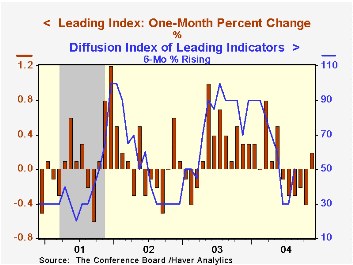 Global| Dec 20 2004
Global| Dec 20 2004Leading Indicators Gain First in Six Months
by:Tom Moeller
|in:Economy in Brief
Summary
The Composite Index of Leading Economic Indicators from the Conference Board rose in November by 0.2%, the first up month since May. October was downwardly revised to a 0.4% decline. The Consensus expectation had been for a 0.1% [...]

The Composite Index of Leading Economic Indicators from the Conference Board rose in November by 0.2%, the first up month since May. October was downwardly revised to a 0.4% decline. The Consensus expectation had been for a 0.1% increase in November.
Six-month growth in the leaders continued to weaken to -2.2%. While it's getting close to call, recession in the U.S. still is not suggested. Negative growth in the leaders exceeding 2.5% preceded past recessionary periods.
Further tempering any negative suggestion is that 60% of the 10 components of the leading index rose over a one month span; the widest breadth of gain since May and the six month breadth rose to 50% versus 30% during the prior two months. The largest positive contributions were made in November by stock prices and the money supply.
The leading index is based on eight previously reported economic data series. Two series, orders for consumer goods and orders for capital goods, are estimated.
In addition, the ratio of the coincident to the lagging indicators (a measure of actual economic performance relative to economic excess) rose for the third month in four to a record high.
The coincident indicators rose by just 0.1% and the six-month growth rate fell to 1.9%, down from the high of 3.3% early this year. During the last ten years there has been an 82% correlation between the six month growth in the coincident indicators and two quarter growth in real GDP.
Visit the Conference Board's site for coverage of leading indicator series from around the world.
The Federal Reserve Bank of St. Louis examines "Gasoline Affordability"in this report.
| Business Cycle Indicators | Nov | Oct | 6-Month Chg | 2003 | 2002 | 2001 |
|---|---|---|---|---|---|---|
| Leading | 0.2% | -0.4% | -2.2% | 1.3% | 2.2% | -0.8% |
| Coincident | 0.1% | 0.4% | 1.9% | 0.4% | -0.5% | -0.5% |
| Lagging | -0.1% | 0.1% | 1.4% | -2.2% | -2.8% | -1.4% |
Tom Moeller
AuthorMore in Author Profile »Prior to joining Haver Analytics in 2000, Mr. Moeller worked as the Economist at Chancellor Capital Management from 1985 to 1999. There, he developed comprehensive economic forecasts and interpreted economic data for equity and fixed income portfolio managers. Also at Chancellor, Mr. Moeller worked as an equity analyst and was responsible for researching and rating companies in the economically sensitive automobile and housing industries for investment in Chancellor’s equity portfolio. Prior to joining Chancellor, Mr. Moeller was an Economist at Citibank from 1979 to 1984. He also analyzed pricing behavior in the metals industry for the Council on Wage and Price Stability in Washington, D.C. In 1999, Mr. Moeller received the award for most accurate forecast from the Forecasters' Club of New York. From 1990 to 1992 he was President of the New York Association for Business Economists. Mr. Moeller earned an M.B.A. in Finance from Fordham University, where he graduated in 1987. He holds a Bachelor of Arts in Economics from George Washington University.
More Economy in Brief
 Global| Feb 05 2026
Global| Feb 05 2026Charts of the Week: Balanced Policy, Resilient Data and AI Narratives
by:Andrew Cates






